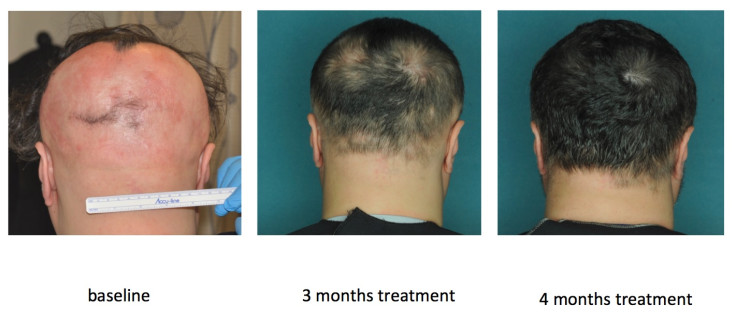Ruxolitinib: FDA-Approved Cancer Drug 'Cures' Alopecia in Four Months

A drug approved by the US Food and Drugs Administration has been found to "cure" alopecia in just a few months.
Ruxolitinib is a Janus kinase inhibitor, also known as a JAK inhibitor, used to treat cancer and other inflammatory diseases.
Researchers at Columbia University Medical Centre (CUMC) were able to identify the immune cells responsible for destroying hair follicles in people suffering alopecia areata.
They then tested ruxolitinib on alopecia sufferers and found the drug eliminated these immune cells, resulting in hair growth in several of the participants who had moderate to severe alopecia. All patients experienced total hair regrowth within five months of starting the treatment.
Published in Nature Magazine, study leader Raphael Clynes said: "We've only begun testing the drug in patients, but if the drug continues to be successful and safe, it will have a dramatic positive impact on the lives of people with this disease."
Alopecia can occur in any person at any age. It is an autoimmune disease where hair is lost either in patches or from the entire body and there are no known treatments.

Four years ago, scientists discovered a "danger signal" in the hair follicles of alopecia patients, where the immune cells are attracted to the follicle and start attacking.
The researchers tracked backwards from this signal to identify the T cells responsible. Findings meant scientists could then identify several key immune pathways that could be targeted by JAK inhibitors.
Both ruxolitinib and tofacitinib stopped the attack on hair follicles and led to hair regrowth in mice.
Researchers then started a small clinical trial of ruxolitinib in patients with alopecia. After four to five months, all had hair regrowth.
"We still need to do more testing to establish that ruxolitinib should be used in alopecia areata, but this is exciting news for patients and their physicians," Clynes said. "This disease has been completely understudied – until now, only two small clinical trials evaluating targeted therapies in alopecia areata have been performed, largely because of the lack of mechanistic insight into it."
Researcher Angela M Christian added: "Patients with alopecia areata are suffering profoundly, and these findings mark a significant step forward for them. The team is fully committed to advancing new therapies for patients with a vast unmet need."
© Copyright IBTimes 2025. All rights reserved.






















